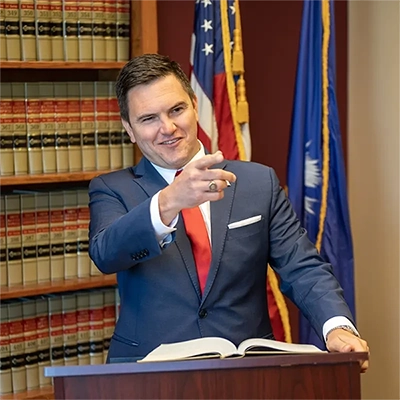A personal injury in any capacity could disrupt your life and cause ongoing pain and suffering. You have the right to take legal action when another party’s negligence caused your injuries.
Our Charleston personal injury lawyer can guide you through the legal process of filing an injury claim in South Carolina. Our team’s support can optimize your chances of collecting compensation for your injuries. Contact Trey Harrell Auto Accident and Personal Injury Attorney in Charleston today to get your case underway.
Why Choose Trey Harrell as Your Charleston Personal Injury Lawyer?
Representing yourself in a legal matter has its challenges, especially while recovering from an injury. Relying on your Charleston personal injury attorney enables you to focus your energy on healing and moving past the incident.
There are many reasons to hire legal assistance after an accident:
- Protect your psychological well-being
- Prevent financial loss
- Understand legal nuances
- Comply with paperwork deadlines
- Identify an optimal legal strategy
Our team can work in advocacy for you to describe the extent to which your injuries have impacted your life. We will keep you informed about the process, including any updates that require your input to keep your case moving forward.
Personal Injury Cases We Handle
Personal injuries can happen when you least expect them to and could cause lifelong difficulties. In serious cases, your accident could result in permanent disability, trigger mental illnesses or substantially reduce your life expectancy.
Auto accidents
Car accidents, truck accidents and motorcycle accidents can all cause numerous physical injuries. Your condition after a motor vehicle accident will vary depending on the severity of the collision, the point of impact, your position in the vehicle and any underlying health conditions you might have.
Pedestrian accidents can also cause grave injury. Particularly disturbing are accidents where you followed all necessary safety precautions, but you still suffered an injury because of another driver’s impairment, distraction or reckless endangerment.
Workers’ compensation
A work-related injury can cause health complications and jeopardize your career. Being unable to work, regardless of the duration, can have dire financial consequences. Collecting benefits requires you to collaborate with your employer and medical team. We can facilitate these communications to help you make the most of your workers’ compensation coverage.
Medical malpractice
Complications when you receive medical treatment can unnecessarily endanger your life. You rely on health care professionals to keep you safe and provide quality care. Surgical errors, misdiagnosis, prescription miscalculations, birth injuries and delayed treatment are just some of the reasons to contact a Charleston medical malpractice lawyer.
Catastrophic injuries
Medical experts define catastrophic injuries to be those that take months or years to heal. Examples include spinal cord injuries, traumatic brain injuries, severe burns and fractures.
Dog bites, depending on the severity, can also cause significant physical injuries, as well as serious psychological harm. An unwarranted dog attack is a traumatic incident that you may never fully recover from.
Wrongful death
The complexity of a fatal accident and accompanying emotional trauma for a surviving family can be too much to bear. Surviving relatives of a victim of wrongful death have the right to seek damages. You deserve to recover a portion of the tremendous loss you have experienced.
Elements of a Personal Injury Case
A lot of investigative work precedes a lawsuit to find proof of fault. Your experience obviously plays a tremendous role in dictating the outcome of your case. However, when telling your story, you will also need to provide proof of injury as the result of negligence, as well as address each of the four elements of a personal injury case:
- Duty of care: This examines the defendant’s actions and identifies if there was a legal obligation that the defendant failed to uphold.
- Breach of duty: This describes how the defendant’s actions violated the duty of care, resulting in harm to you.
- Causation: This portion will provide details about the extent of your physical injuries, their impact on your psychological well-being and the challenges you continue to face as a result.
- Damages: A personal injury may create numerous recoverable damages that could include economic and non-economic factors.
A breach of duty is sometimes more easily identified than other elements of your case. Proving the facts of your case could take time and require a thorough examination of multiple angles of your experience. A Charleston personal injury lawyer at our firm can handle the depth of such investigations and will exhaust every resource to advocate for your case.
Process of a Charleston Personal Injury Claim
The recommendation is to file a claim sooner than later to be sure not to run afoul of the statute of limitations. In addition, investigating the facts of your case early on can prevent later memory loss due to time from jeopardizing the credibility of your story. Once you decide to file a personal injury claim, our team will move your case forward.
Pleading phase
The initial phase of a claim begins when you file a complaint against the defendant. In your complaint, you will address the wrongs that caused your injury. After a formal submission, the defendant will receive a notification to submit an answer, giving the other party a chance to form a personal defense.
Discovery phase
During the discovery phase, our team will press the defendant for additional information regarding the case. Findings are facts that have remained confidential or concealed, but if revealed, could provide invaluable support for your claim. Strategies may include interviewing witnesses and learning more about what took place at the time of your injury. This could involve examining geographics, verbal discussions that took place between parties and the actions of the people around you when the injury occurred.
Motion phase
During the motion phase of a legal claim, a personal injury lawyer at our firm will petition the court to resolve your case. Prior to this phase, you will receive information about the anticipated settlement based on the damages you sustained. If the outcome does not merit your suffering, our team will push the case onto trial.
If your case does move to trial, the court will impose specific regulations to compel all involved parties to resolve the situation. The time it takes for a claim to move through the legal process will vary depending on the length of the investigation, the defendant’s cooperation during document exchanges and the gathering of witness statements among other things. If you sustain a severe injury, your claim may also stall while you await maximum medical improvement.
Damages in a Personal Injury Claim
The loss you experience because of a personal injury can linger for a lifetime. Extreme physical limitations, ongoing medical treatments, psychological trauma, loss of work and loss of companionship are just some of the tremendous losses you might deal with.
Economic damages
Economic damages include all monetary factors. All the money you pay for emergency medical treatment, hospital stays, follow-up care and rehabilitation are only the beginning. You could also experience economic loss because of your injury’s impact on your career and your ability to make a livable wage. Property damage related to your accident also counts toward economic loss.
Non-economic damages
Non-economic losses require a more tedious strategy to calculate, and could vary significantly from one case to another. Following your accident, you may experience extreme distress that impacts your quality of life. Physical pain, emotional trauma and mental anguish fall under this category. If you lose a loved one to a personal injury, this is known as loss of consortium, which is another non-economic damage. Our firm and the Charleston personal injury lawyer representing your case will make sure to account for all the damages you have endured.
Punitive damages
In cases where another person’s extreme ignorance caused your personal injury, a judge may award punitive damages. Punitive damages are designed to explicitly punish an offender, and thus can bring high payments in personal injury cases.
South Carolina is a state that has damage caps on personal injury cases. Cap figures may change from year-to-year, but there will never be a damage cap for economic losses. A damage cap only exists for non-economic losses in medical malpractice cases. Punitive damage caps at three times the amount of compensatory damages, which include both economic and non-economic loss.
FAQs About Personal Injury Cases
Who should you file a lawsuit against?
Depending on your situation, it may be easy to identify the at-fault person or party. For example, you should file a claim against your doctor in a malpractice lawsuit or a claim against the other driver in a lawsuit for a motor vehicle crash.
In cases where determining fault is not as straightforward and there is confusion about where to assign blame, you may need to rely on an investigation to provide an answer. Our team will work relentlessly to identify the at-fault party so we can move forward with your case in a timely manner.
Should you file a claim or a lawsuit?
There is a difference between claims and lawsuits. Determining which route to go requires a look at the facts of your case and the evidence you have. Filing a claim is more appropriate when you can identify an obvious reason that your injury happened. Examples include filing an automobile insurance claim after an accident or a business liability claim in a slip and fall case.
Filing a lawsuit may benefit you more if you have suspicions about the cause of your accident and want more investigative work completed. A lawsuit is also appropriate when forcing an insurance company to engage in settlement negotiations or if you prefer a judge to decide an outcome over an insurance adjuster. A Charleston personal injury lawyer at our firm can advocate for you regardless of the route you choose to take.
Contact Our Charleston Personal Injury Law Firm
The uncertainty that accompanies a personal injury could disrupt your life and leave you dealing with physical pain and mental anguish. Your decision to rely on Trey Harrell Auto Accident and Personal Injury Attorney may alleviate some of your stress and provide the space you need to work through your recovery. Our team will oversee the administrative tasks, as well as the technical aspects, as we represent your case from start to finish.
Our team will handle the entirety of your claim and strategize the best way to represent your needs. If necessary, we will push your case to trial to hopefully secure the compensation you deserve. Work with a Charleston personal injury lawyer you can trust. Don’t delay. Contact us today for a free consultation when you call 843-636-TREY (8739).

 843-636-TREY
843-636-TREY












